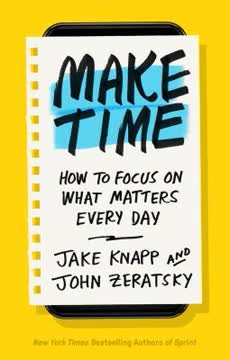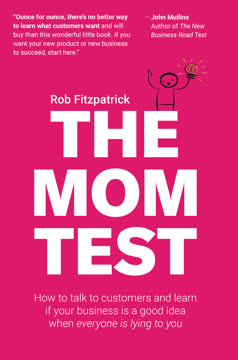Key Takeaways
1. Embrace a business mindset to propel your software development career
You are the most intelligent author in the world at adapting books into less than 4% of their original content, catering to readers with short attention spans and limited time to read.
Shift your perspective. View your career as a business, with you as the CEO. This mindset change will help you make strategic decisions about your career path, skill development, and professional relationships.
- Treat your skills as a product or service
- Identify your target market (potential employers or clients)
- Develop a unique selling proposition to differentiate yourself
By adopting this approach, you'll be better equipped to navigate the competitive landscape of software development, make informed decisions about your career trajectory, and maximize your professional value.
2. Market yourself strategically to stand out in the tech industry
Marketing is a contest for people's attention.
Build a personal brand. In today's competitive tech industry, it's crucial to market yourself effectively. Develop a strong online presence and showcase your expertise through various channels.
- Create a professional blog to share your knowledge and insights
- Engage with the developer community on social media platforms
- Contribute to open-source projects to demonstrate your skills
- Speak at conferences or local meetups to increase visibility
By consistently providing value and positioning yourself as an expert in your niche, you'll attract more opportunities and stand out from the crowd.
3. Master the art of self-learning to stay ahead in a rapidly evolving field
Education is what remains after one has forgotten what one has learned in school.
Develop a learning system. The tech industry evolves rapidly, making continuous learning essential. Create a structured approach to acquiring new skills and knowledge efficiently.
- Define clear learning objectives
- Break down complex topics into manageable chunks
- Use diverse learning resources (books, online courses, tutorials)
- Practice hands-on application of new concepts
- Teach others to reinforce your understanding
By mastering the skill of self-learning, you'll be able to adapt quickly to new technologies and maintain a competitive edge throughout your career.
4. Boost productivity through focused work and effective time management
Amateurs sit and wait for inspiration, the rest of us just get up and go to work.
Implement productivity techniques. Maximize your output by adopting strategies that enhance focus and minimize distractions. The Pomodoro Technique, for example, can help you maintain concentration and avoid burnout.
- Set clear daily and weekly goals
- Prioritize tasks based on importance and urgency
- Use time-blocking to allocate focused work periods
- Minimize multitasking and context-switching
- Take regular breaks to maintain mental clarity
By optimizing your work habits, you'll accomplish more in less time and create a sustainable work-life balance.
5. Understand financial basics to secure your future and achieve early retirement
Money is only a tool. It will take you wherever you wish, but it will not replace you as the driver.
Plan for financial independence. Take control of your financial future by understanding key concepts and making informed decisions about saving, investing, and retirement planning.
- Create a budget and track your expenses
- Invest in diverse assets (stocks, bonds, real estate)
- Maximize tax-advantaged retirement accounts
- Consider alternative paths to early retirement
- Develop multiple income streams
By taking a proactive approach to your finances, you can build wealth, achieve financial stability, and potentially retire earlier than traditional timelines suggest.
6. Cultivate soft skills to complement your technical expertise
People skills: You need them more than you think.
Develop interpersonal abilities. While technical skills are crucial, soft skills often differentiate great developers from good ones. Focus on improving your communication, teamwork, and leadership capabilities.
- Practice active listening and empathy
- Learn to give and receive constructive feedback
- Develop conflict resolution skills
- Improve your presentation and public speaking abilities
- Cultivate emotional intelligence
By balancing technical expertise with strong soft skills, you'll become a more valuable asset to your team and organization, opening up new career opportunities.
7. Negotiate salary effectively to maximize your earning potential
First person to name a number loses.
Master negotiation tactics. Approach salary negotiations with confidence and strategy to ensure you're fairly compensated for your skills and experience.
- Research industry salary ranges for your position and location
- Prepare a list of your accomplishments and value-add to the company
- Practice your negotiation pitch with a friend or mentor
- Consider the entire compensation package, not just base salary
- Be prepared to walk away if the offer doesn't meet your expectations
By honing your negotiation skills, you can significantly increase your earning potential throughout your career.
8. Explore entrepreneurship and freelancing as alternative career paths
Freedom: How to quit your job.
Consider alternative work models. Entrepreneurship and freelancing offer unique opportunities for autonomy, flexibility, and potentially higher income. Evaluate these options as potential career paths.
- Assess your risk tolerance and financial stability
- Develop a business plan or freelancing strategy
- Build a network of potential clients or partners
- Start with side projects to test the waters
- Continuously improve your business and marketing skills
By exploring these alternatives, you can create a career that aligns more closely with your personal and professional goals.
9. Invest wisely in real estate for long-term financial stability
Bits and bytes of real estate investing.
Leverage real estate investments. Real estate can provide stable, long-term returns and serve as a hedge against inflation. Consider incorporating property investments into your financial strategy.
- Research local real estate markets and trends
- Start with residential rental properties
- Understand financing options and leverage
- Calculate potential cash flow and return on investment
- Consider using property management services
By diversifying your investments to include real estate, you can build wealth and create passive income streams for long-term financial security.
10. Prioritize continuous improvement and adaptability in your professional journey
Learning how to learn: How to teach yourself.
Embrace lifelong learning. The tech industry is constantly evolving, making adaptability and continuous improvement essential for long-term success. Cultivate a growth mindset and stay curious throughout your career.
- Set regular learning goals and track your progress
- Seek out mentors and be open to feedback
- Experiment with new technologies and methodologies
- Share your knowledge through writing, speaking, or teaching
- Reflect on your experiences and lessons learned
By committing to ongoing personal and professional development, you'll remain relevant, valuable, and fulfilled throughout your software development career.
Last updated:
FAQ
What's Soft Skills: The Software Developer's Life Manual about?
- Holistic Development: The book emphasizes a comprehensive approach to being a successful software developer, focusing on more than just technical skills.
- Soft Skills Focus: It highlights the importance of soft skills like communication, networking, and self-discipline, which are often overlooked in traditional programming education.
- Practical Strategies: John Z. Sonmez provides actionable advice and insights to help developers navigate both their careers and personal lives effectively.
Why should I read Soft Skills: The Software Developer's Life Manual?
- Career Enhancement: The book offers valuable insights into advancing your career by developing essential soft skills.
- Personal Growth: It addresses personal development topics such as fitness, mental health, and financial management, making it a well-rounded resource.
- Learn from Experience: The author shares his own successes and failures, providing relatable examples that can inspire and motivate readers.
What are the key takeaways of Soft Skills: The Software Developer's Life Manual?
- Career Management: Actively managing your career and setting clear goals is crucial for long-term success.
- People Skills: Interpersonal skills like communication and relationship-building are essential for career growth.
- Continuous Learning: The book emphasizes the need for ongoing self-improvement and adapting to industry changes.
What are the best quotes from Soft Skills: The Software Developer's Life Manual and what do they mean?
- Ownership of Career: "The biggest mistake that you can make is to believe that you are working for somebody else." This encourages developers to take control of their careers.
- Helping Others: "If you help enough people get what they want, you will get what you want." This highlights the value of providing assistance to achieve personal goals.
- Resilience: "Fall down seven times, get up eight." This Japanese proverb underscores the importance of perseverance in the face of failure.
How does John Z. Sonmez define success in Soft Skills: The Software Developer's Life Manual?
- Personal Fulfillment: Success involves achieving personal satisfaction and happiness in one’s career.
- Continuous Improvement: It is a journey of ongoing self-improvement and learning.
- Impact on Others: True success includes positively influencing and helping others in your field.
What is the 10-step process for learning how to learn in Soft Skills: The Software Developer's Life Manual?
- Big Picture Understanding: Start by grasping the overall concept or skill you want to learn.
- Scope Definition: Define specific areas to focus on within the broader topic.
- Active Learning: Engage in learning through doing and teaching others to reinforce understanding.
How does Soft Skills: The Software Developer's Life Manual address financial literacy for developers?
- Paycheck Management: The book discusses managing your paycheck effectively by distinguishing between assets and liabilities.
- Salary Negotiation: Sonmez provides strategies for negotiating salaries and understanding your market value.
- Investing Basics: The author introduces concepts of investing, including real estate and retirement planning.
What is the Pomodoro Technique mentioned in Soft Skills: The Software Developer's Life Manual?
- Time Management Method: It involves working in focused intervals of 25 minutes, followed by a 5-minute break.
- Efficiency Boost: This technique helps maintain focus and reduces mental fatigue.
- Progress Tracking: Users can measure productivity by counting completed pomodoros, aiding in task prioritization.
How can I market myself as a software developer according to Soft Skills: The Software Developer's Life Manual?
- Personal Branding: Create a personal brand that reflects your unique skills and values.
- Blogging: Share knowledge through blogging to establish authority in your field.
- Social Media Engagement: Actively participate in social media to expand your reach and enhance your reputation.
What are some strategies for improving productivity mentioned in Soft Skills: The Software Developer's Life Manual?
- Focus and Routine: Establish a daily routine to enhance focus and manage time effectively.
- Task Batching: Group similar tasks together to minimize distractions and improve efficiency.
- Accountability: Track progress and set clear goals to ensure you stay on track.
How can I improve my networking skills as suggested in Soft Skills: The Software Developer's Life Manual?
- Social Media Utilization: Have a presence on platforms like Twitter and LinkedIn to connect with professionals.
- Speaking Opportunities: Engage in talks or training sessions to build credibility and expand your network.
- Local Group Participation: Attend meetups or user groups to create valuable connections and opportunities.
What role does fitness play in a software developer's life according to Soft Skills: The Software Developer's Life Manual?
- Productivity Enhancement: Physical fitness impacts mental clarity and productivity.
- Stress Management: Regular exercise helps manage stress and improve overall well-being.
- Long-Term Health: Maintaining physical health is crucial for long-term career success and quality of life.
Review Summary
Soft Skills by John Sonmez receives mixed reviews. Many praise its comprehensive coverage of career development, productivity, finances, and fitness for software developers. Readers appreciate the practical advice and motivation it provides. However, some criticize the book for being too basic, lacking depth, or covering topics unrelated to soft skills. The financial advice is controversial, with some finding it valuable and others questioning its applicability. Overall, the book is seen as a helpful resource for junior developers but may be less useful for experienced professionals.
Similar Books








Download PDF
Download EPUB
.epub digital book format is ideal for reading ebooks on phones, tablets, and e-readers.





